#RedLightCameras
Tennessee Attorney General Backs Right Turn Camera Ticket Ban
The Tennessee General Assembly is free to impose limitations on the use of automated ticketing machines, according to an opinion issued Monday by Attorney General Robert E. Cooper Jr. Cities and photo enforcement companies had complained that the legislature had “impaired contracts” when it enacted a law in July prohibiting the issuance of photo tickets to drivers making slow right turns on red. Right-turn citations have become the primary moneymaker for red light camera systems nationwide.
More Ohio Cities to Hold Anti-Traffic Camera Votes
In the past five years, five Ohio cities have voted to ban photo enforcement, and two more might be added to the list. The Cuyahoga County Board Of Elections is now counting signatures from residents in South Euclid and East Cleveland who are determined to prohibit automated ticketing in November. On August 3, organizers in East Cleveland handed in 1624 signatures, well more than the 358 needed to qualify in the city of 18,000. South Euclid activists turned in 1076 signatures on July 25.
Washington: Traffic Camera Executive Orchestrated Anti-Voter Suit
Photo enforcement vendor American Traffic Solutions (ATS) could find itself in trouble for lying before the Washington Supreme Court about its involvement in attempts to overturn a ballot initiative in Mukilteo last year. The Everett Herald newspaper obtained emails from former ATS Vice President Bill Kroske that show he attempted to collude with the city’s mayor to deny the public an opportunity to vote on banning red light cameras and speed cameras.
Washington: Court Denies Attempt to Block Public Vote on Traffic Cameras
Voters in Bellingham, Washington are likely to have the final say in whether or not to continue using red light cameras and speed cameras. A Whatcom County Superior Court judge yesterday threw out the attempt by photo enforcement vendor American Traffic Solutions (ATS) to immediately block the measure from being considered. The court believes ATS has an uphill battle to prove its case.
“ATS has not demonstrated that it will suffer immediate and irreparable injury if the temporary restraining order is not granted,” Judge Steven Mura ruled. “ATS’s motion for a temporary restraining order is denied.”
Houston Residents Unload on City Council Over Red Light Decision
Hundreds of Houston, Texas residents swarmed the city council chambers yesterday to complain about the reactivation of red light cameras. Voters in November enacted a charter amendment banning the use of automated ticketing machines, but a federal judge worked with the city attorney and vendor American Traffic Solutions (ATS) to nullify the election so that the cameras could come back.
“Ever since I was a little kid I was told this was the greatest nation in the world and it was great because I had a vote and my vote counted,” resident Terry Dry said. “It appears my vote does not. I’m asking y’all as our elected leaders, we voted. Turn them off. And if you’re not going to do that, I would like to know where each council member stands on the issue so that we can get some people in here who will do the people’s will in the next election.”
Washington: Anti-Camera Referendum Sponsors Fight Back
Backers of ballot initiatives that would ban photo enforcement in a number of cities in Washington state are fighting back against municipal efforts to silence their vote. Traffic camera companies have become increasingly bold in their efforts to prevent the public from deciding whether red light cameras and speed cameras should be used in any given community.
American Traffic Solutions (ATS) scored its first victory in May when it found an activist judge in Chelan County willing to block residents from even filing a petition to their government regarding the use of traffic cameras in the community ( read decision). Just days after the decision came down, the state supreme court discussed traffic camera initiatives, and several justices pointed out that blocking signature collection efforts would be a violation of the state constitution. Nonetheless, to bypass the legal blockade, initiative co-sponsor Matt Erickson is circulating a second petition that schedules an advisory vote on taking down the cameras at every election until the devices are finally removed.
Los Angeles, California Red Light Camera Program Officially Canceled
Red light cameras are coming down in Los Angeles, California after midnight on Sunday. The city council yesterday voted unanimously to drop the program primarily over the county court system’s refusal to enforce unpaid tickets, depriving the city of millions in expected revenue. The council instructed the city attorney to work with American Traffic Solutions (ATS) to decide the cheapest way to remove the systems and process all tickets issued through the end of the month.
“We need to be clear about what we are doing here today with this particular vote,” Councilman Dennis P. Zine said. “I don’t want to give the wrong perception to the public that this program may continue in the future. As I noted, photo red light will be gone in four days. Cameras need to come down immediately to not create a smokescreen to affect the hope that we may turn them back on.”
Los Angeles Red Light Cameras Die On Sunday; If You Have A Ticket, You Might Want To Ignore It
The LA Times reports:
The City Council voted unanimously Wednesday to halt Los Angeles’ controversial red-light camera program, which has ticketed more than 180,000 motorists since beginning in 2004. The program will officially end July 31.
The action followed a similar vote last month by the city Police Commission, which sought to drop the 32-camera program in part because of the difficulty in collecting fines.
But wait, the news gets better! Earlier today, the LAT helped bust the photo enforcement program wide open, reporting:
City officials this week spotlighted a surprising revelation involving red-light camera tickets: Authorities cannot force violators who simply don’t respond to pay them. For a variety of reasons, including the way the law was written, Los Angeles officials say the fines for ticketed motorists are essentially “voluntary” and there are virtually no tangible consequences for those who refuse to pay.
It’s a little more complicated than that, but those are the broad strokes.
Richard Retting Cashes in on Lifetime of Traffic Camera Advocacy
The one man most responsible for the spread of red light cameras in the United States is now enjoying the fruit of his labor. Richard A. Retting was New York City’s deputy assistant commissioner for traffic safety programs as the Big Apple considered becoming the first in the US to operate intersection cameras. Planning for the program began in 1983 and continued through 1991 when then-Mayor David Dinkins activated the system. For this achievement, Retting was dubbed the father of the red light camera in America, and today he is earning money directly from the systems that have followed New York’s lead.
California City to Vote on Banning Red Light Cameras
A third jurisdiction in Orange County, California is taking steps to ban the use of red light cameras. Later today the city council in Orange will vote on the first reading of an ordinance that would deter future councils from considering the devices. The city of 136,000 residents has never used photo enforcement, but the council unanimously directed the city attorney’s office in October to come up with the most effective language to deter future councils from considering them.
Texas: Federal Judge Again Blocks Defense of Houston Anti-Camera Vote
On Sunday red light cameras will begin issuing citations once again in Houston, Texas despite the election result of November where a majority demanded the devices be taken down. US District Court Judge Lynn N. Hughes continues to deny the ability of the sponsors of the anti-camera initiative, Randall Kubosh and Francis M. Kubosh, to defend their effort against an election challenge mounted by American Traffic Solutions (ATS). Hughes on Wednesday ordered several legal arguments by the Kuboshes erased from the record.
“In court pleadings, the Kuboshes may not denominate themselves as intervenors, counter-defendants, third-party defendants, respondents, or anything else that they are not,” Hughes wrote in a separate July 7 order striking another legal brief. “In public, they may call themselves whatever they want.”
Tennessee: Man Sues Traffic Camera Company Over Double Billing
Drivers often get the run around when dealing with the traffic ticket bureaucracy. When fighting city hall, individuals usually have no little hope of prevailing. Motorist Harry A. Church realized that with red light cameras, the system was outsourced from city hall to a company that could be more easily sued. After being double-billed by the Australian red light camera company Redflex Traffic Systems, Church filed a lawsuit that has been taken up by the US District Court for the Eastern District of Tennessee.
California: More Cities Dropping Red Light Cameras
Three Southern California cities are taking steps to rid themselves of red light cameras. In Westminster, the city council decided unanimously on Wednesday to ask voters to ban the use of red light cameras in a referendum scheduled for November 2012.
“We gave very clear instructions… to city managers that this red light camera system will not be discussed or considered to be installed in any part of our city,” Councilman Andy Quach said on Wednesday. “Tonight is basically a reiteration of that already existing policy…. The council has historically never liked anything that could be considered monitoring its citizens by Big Brother.”
Washington: City Sued for Blocking Anti-Camera Referendum
Opponents of red light cameras and speed cameras are taking the offensive against city councils and camera vendors who have been taking extreme measures to keep the issue of automated ticketing off the ballot. A Cowlitz County, Washington superior court judge will hear arguments later today in a countersuit that accuses the city of Longview of violating an anti-SLAPP law. The state last year banned what are called “strategic lawsuits against public participation” with a measure that grants expedited court procedures to initiative sponsors and a $10,000 penalty against anyone found to be exploiting the legal system to thwart a petition drive.
IIHS Study Loves Red Light Cameras, Says Americans Do Too
The controversy over red light cameras, once relegated to websites like TTAC, thenewspaper.com, motorists.org and highwayrobbery.net, is hitting the mainstream media thanks to a new study by the IIHS [ PDF here]. The study used the following methodology:
Telephone surveys were conducted with 3,111 drivers in 14 large cities (population greater than 200,000) with long-standing red light camera programs and 300 drivers in Houston, using random samples of landline and cellphone numbers. For analyses combining responses from the 14 cities, cases were weighted to reflect each city’s share of the total population for the 14 cities.
And what did they find?
Among drivers in the 14 cities with red light camera programs, two-thirds favor the use of cameras for red light enforcement, and 42 percent strongly favor it. The chief reasons for opposing cameras were the perceptions that cameras make mistakes and that the motivation for installing them is revenue, not safety. Forty-one percent of drivers favor using cameras to enforce right-turn-on-red violations. Nearly 9 in 10 drivers were aware of the camera enforcement programs in their cities, and 59 percent of these drivers believe the cameras have made intersections safer. Almost half know someone who received a red light camera citation and 17 percent had received at least one ticket themselves. When compared with drivers in the 14 cities with camera programs, the percentage of drivers in Houston who strongly favored enforcement was about the same (45 percent), but strong opposition was higher in Houston than in the other cities (28 percent versus 18 percent).
Sounds like those red light cameras are pretty great after all, doesn’t it? That’s certainly the IIHS’s takeaway…



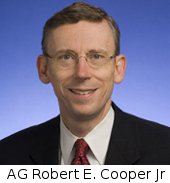



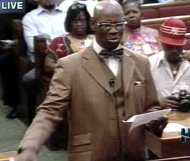
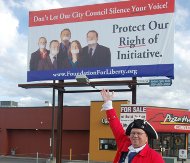
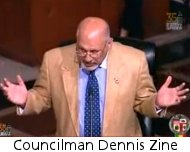
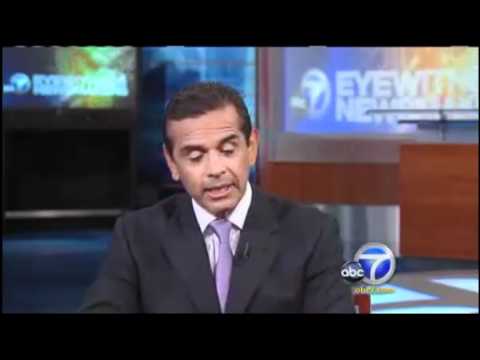


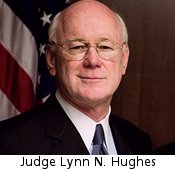
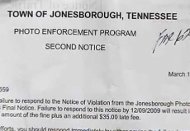













Recent Comments